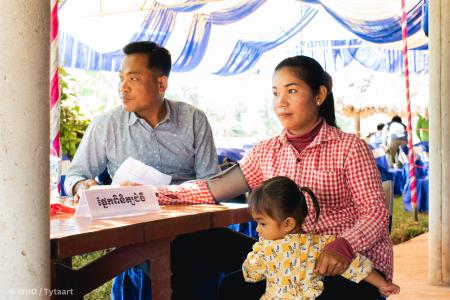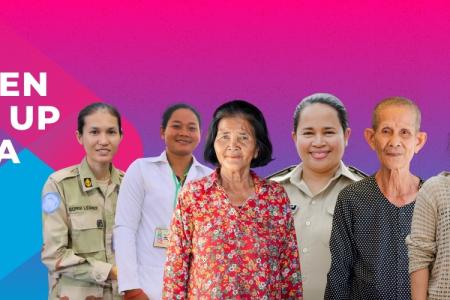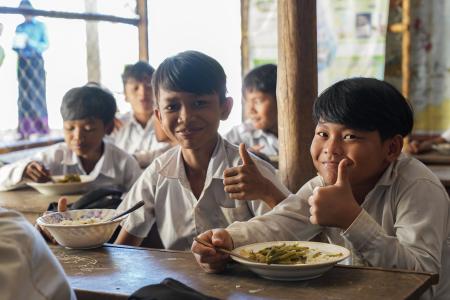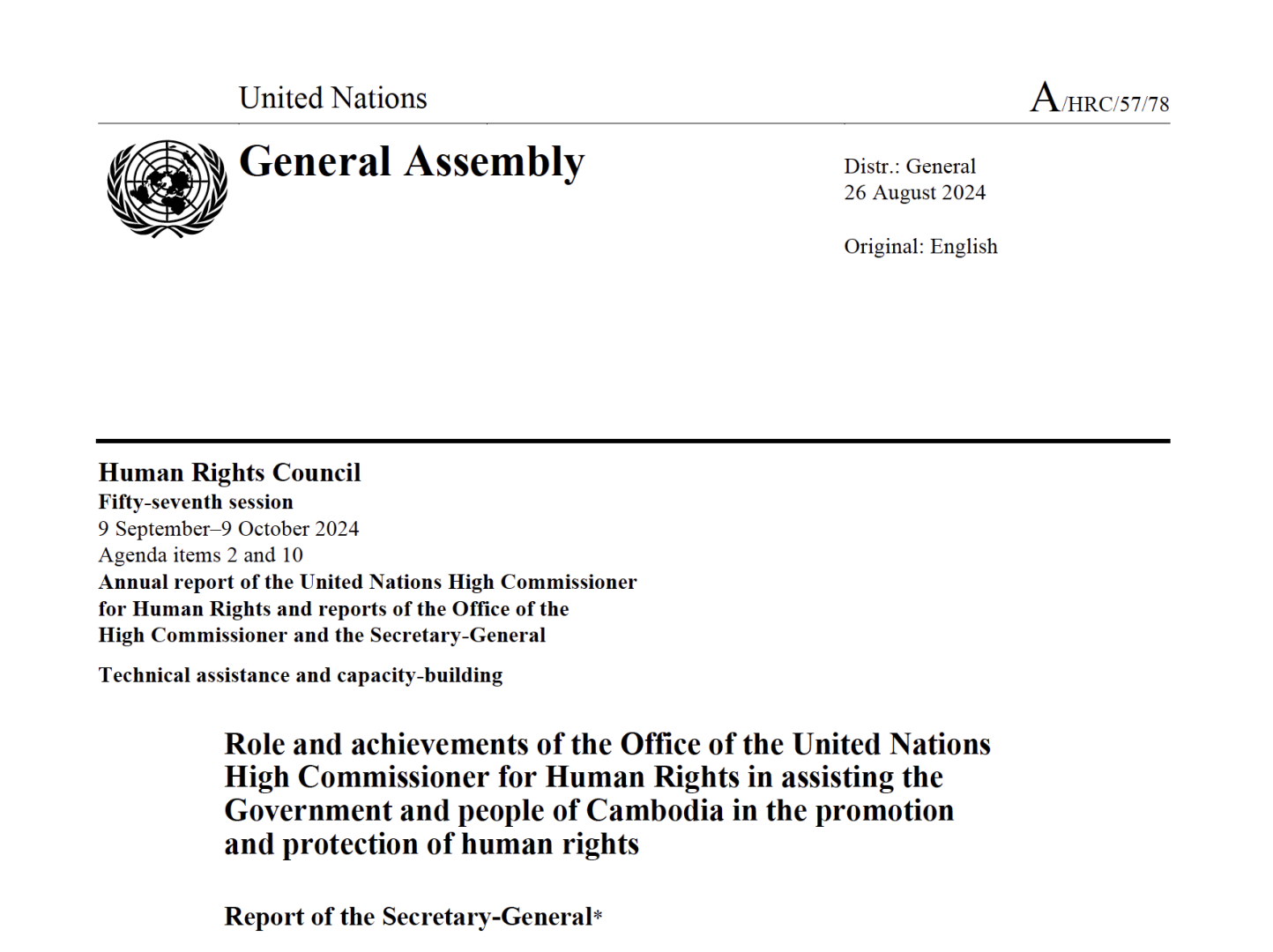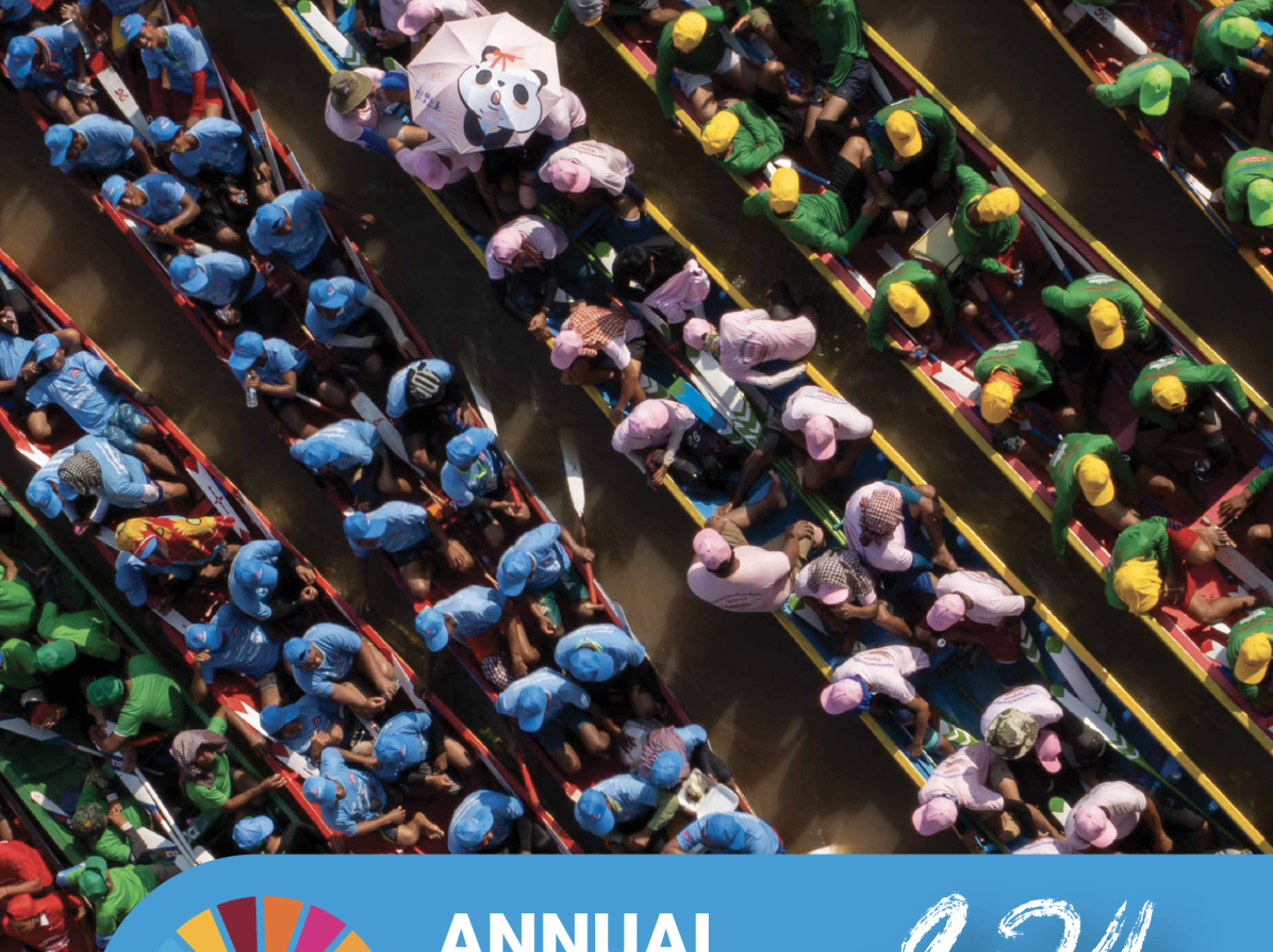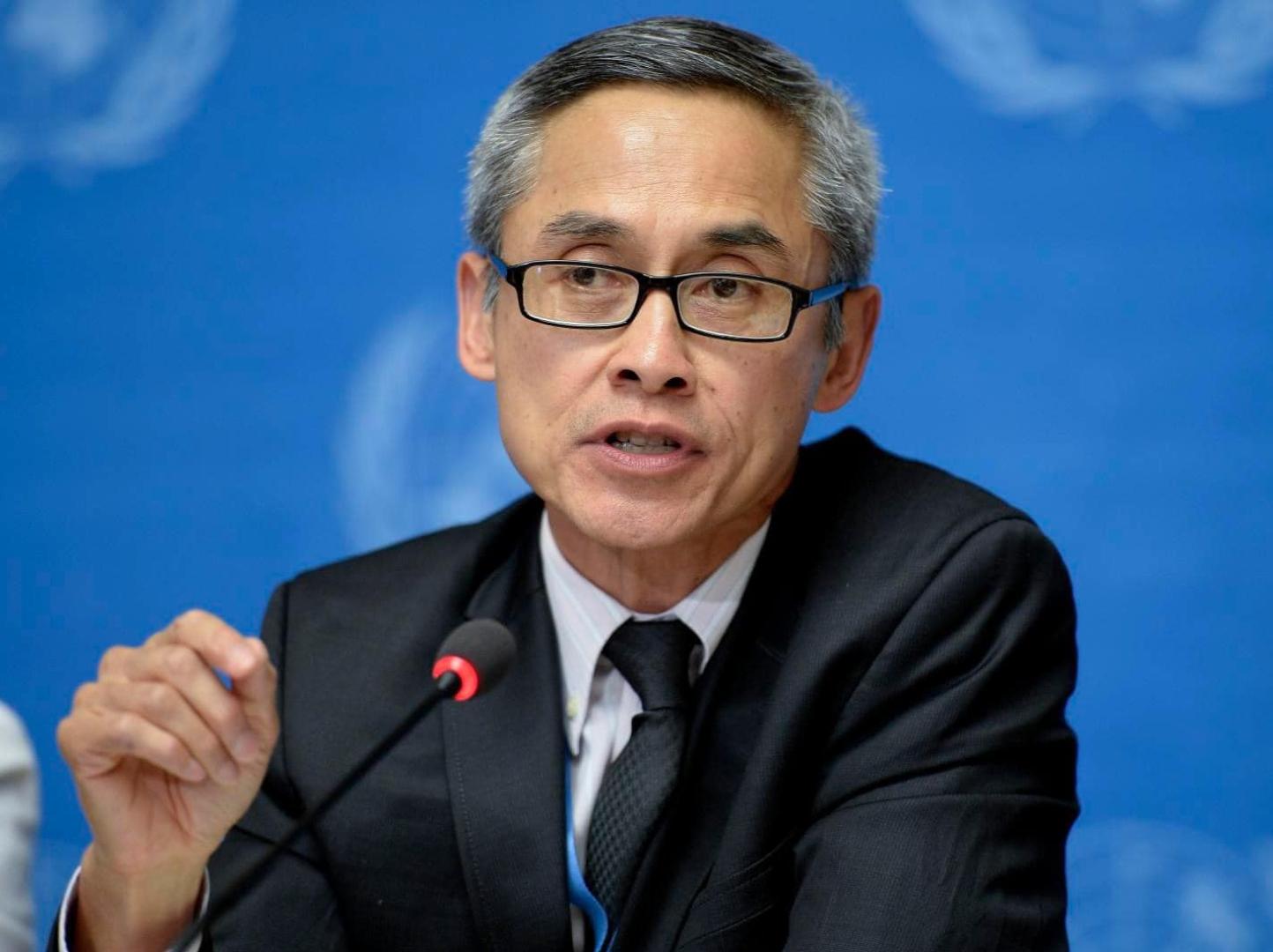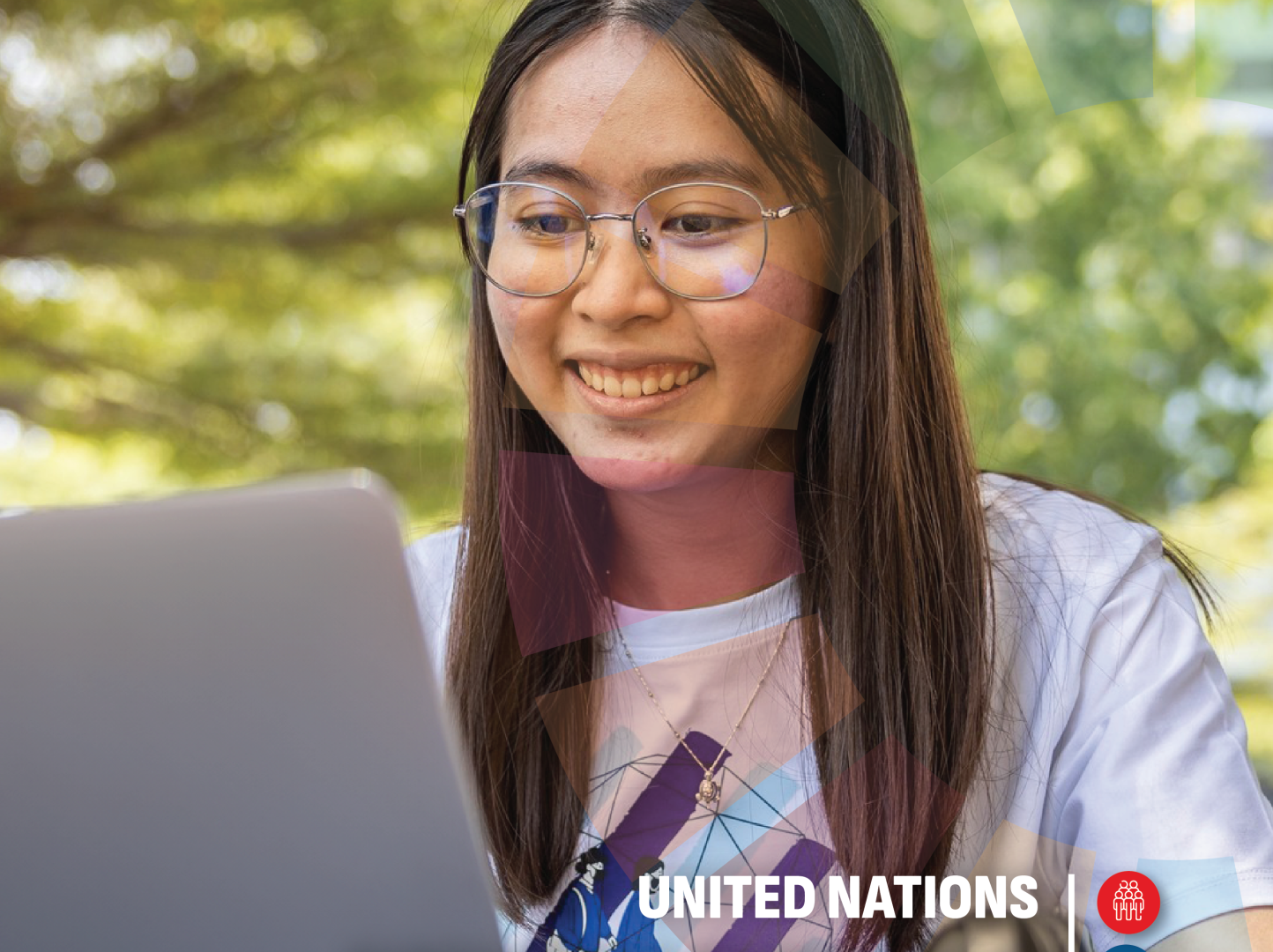Latest
Speech
10 July 2025
Send-Off ceremony of Cambodian Peacekeepers to the Central African Republic (MINUSCA) Force Construction Engineer Company 486
Learn more
Speech
19 June 2025
RGC townhall on the ECCC legacy institution
Learn more
Press Release
05 June 2025
CPC Takes a Step Forward in Packaging Excellence with WPO's Membership
Learn more
Latest
The Sustainable Development Goals in Cambodia
The Sustainable Development Goals are a global call to action to end poverty, protect the earth’s environment and climate, and ensure that people everywhere can enjoy peace and prosperity. These are the goals the UN is working on in Cambodia. Cambodia has added an 18th goal to its localized version of the Sustainable Development Goals (SDGs)- "End the negative impact of mins/ERW and promote victim assistance".
Story
28 April 2025
From Awareness to Action: Cambodia's Fight Against Tuberculosis
In the village of O’Krasa, Kep Province, Dr Hun Sokkea, the Director of the O’Krasa Health Center is leading the fight against tuberculosis (TB). At just 35, she has dedicated over a decade to keeping her community healthy and informed.Despite being preventable and curable, TB remains the world’s deadliest infectious disease, claiming 1.5 million lives annually. Cambodia has made remarkable progress in combating TB, as reflected in two surveys conducted in 2002 and 2011. Over that period, Cambodia achieved a 45% reduction in the prevalence of bacteriologically confirmed TB.However, challenges persist. According to Dr Sokkea, many residents lack awareness about TB, underestimating its risks and believing it only affects those with a family history. This misconception hinders early detection and treatment, further fueling transmission.Health workers at the O’Krasa Health Center play a critical role in combating these challenges. They provide free treatment, educate patients, and raise awareness about prevention. Community outreach efforts aim to identify at-risk individuals, helping curb TB transmission and reduce its impact on livelihoods.A significant milestone for the community came with the third TB Prevalence Survey, launched in 2023 with field operations completed in May 2024. Conducted across 84 sites, the survey confirmed a continued decline in TB prevalence. “We are proud that Cambodians are contributing to understanding TB’s burden and seeking timely treatment,” said Dr Huot Chan Yuda, Director of the National Centre for Tuberculosis and Leprosy Control.While the official launch of the results and report is planned for March 2025, the preliminary survey results are already shaping Cambodia’s TB strategic interventions for 2025–2027. One key finding revealed that 33,3% of TB cases in 2023 were asymptomatic, compared to 10% in 2011. In response, the program has started introducing AI-assisted chest X-ray technology to improve community screening.Dr Sokkea hopes to inspire more residents to seek regular health screenings, emphasizing the importance of early intervention. As she reflects, “Health is the most important thing. If we have good health, wealth will follow.” Cambodia’s progress against TB underscores the power of knowledge, collaboration, and care, proving no one must fight TB alone.
1 of 5
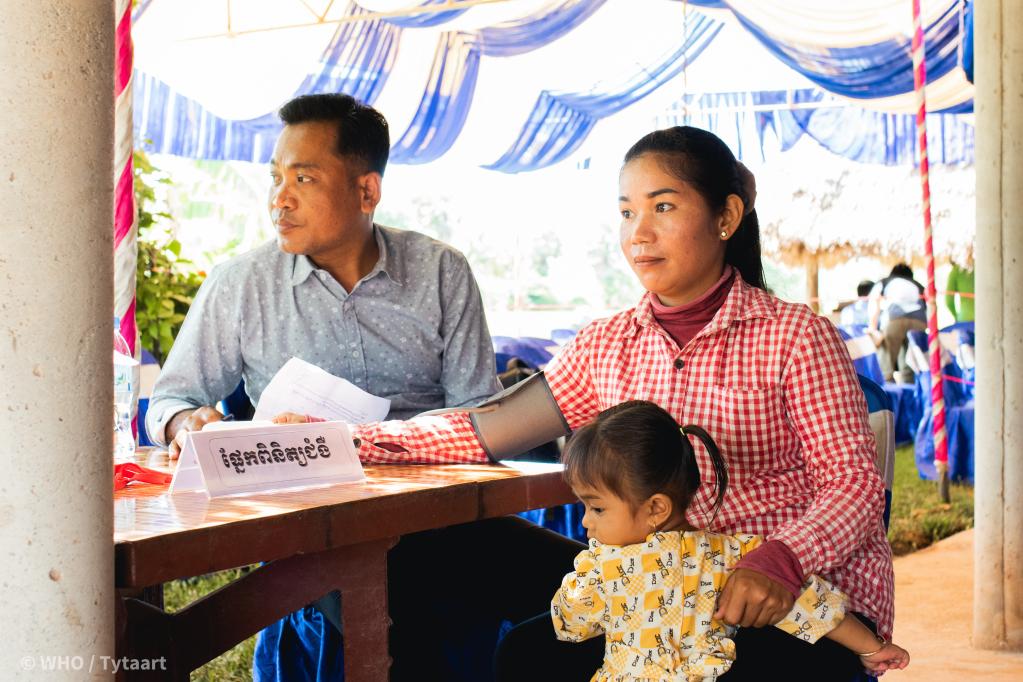
Story
07 March 2025
The Women Who Lift Up Cambodia: International Women’s Day 2025 – Rights, Equality, Empowerment for All Women and Girls
"Women work hard and rarely complain. Women at home do everything—raising children, cooking, cleaning, and running businesses—all from morning until night. Yet, their work often goes unrecognised." These words from Long San, a 66-year-old small business owner in Kampong Speu, reflect the reality for many women across Cambodia, even amidst the progress that has been made.On this International Women's Day, we celebrate the farmers, migrant workers, business owners, caregivers, peacekeepers, health workers and midwives and elders—the everyday heroes of Cambodia. Though their stories are often unheard, their resilience is the foundation of our communities. Under the theme "For ALL Women and Girls: Rights. Equality. Empowerment," we recognise a reality: the women who lift up Cambodia continue to face challenges to recognition, equality, and the full exercise of their rights. PROGRESS AND PERSISTENT BARRIERS Despite their invaluable contributions, Cambodian women remain underrepresented in leadership. While progress has been made—such as a government decree requiring that one in three village leaders be women—significant disparities persist. In 2020, women held 21 percent of National Assembly seats and 16 percent of Senate seats. However, their representation declined after the 2023 elections, falling to 13 percent in parliament. Women now account for only 10 percent of Ministers and 15 percent of Secretaries or Under Secretaries of State, despite making up 42 percent of the civil service.Chhin Savy, one of Cambodia’s few female Commune Chiefs, exemplifies both progress and resilience. “I hope to see more women in leadership in the future,” she asserts. “Women are just as capable as men and deserve equal pay.” Her perspective highlights an urgent truth: greater women’s representation is not just about fairness; it strengthens governance. “If more women hold leadership roles, it will benefit the country. Women understand family well-being and excel at resolving community conflicts.” INVISIBLE LABOURFrom political leadership to economic survival, Cambodian women perform essential but often invisible labour. Nowhere is this more evident than among the 1.1 million Cambodian migrant workers abroad—nearly half of whom are women. The money they send back home is a lifeline for their families and communities, contributing over $3 billion in 2021, and nearly 5 per cent of Cambodia’s GDP. Pin Sreynoun, a Cambodian migrant worker in Thailand, explains the delicate balance she maintains: “I work as a gardener, which gives me time to cook for my family and handle my work at home.” While she benefits from fair conditions, many others do not. Despite the sustained efforts of the Cambodian government, NGOs, and UN agencies to promote safe migration, women migrant workers continue to face significant challenges, including exploitation, poor legal protections, and limited access to essential services. ENTREPRENEURSHIP AND RESILIENCEWomen who remain in Cambodia often navigate their own economic struggles, running businesses while facing financial and social constraints. Women small business owners are the backbone of Cambodia’s economy, with 84.1 per cent of women engaged in the labour force and owning most micro-enterprises. Yet, they grapple with persistent barriers—gender pay gaps, restricted access to credit, and limited social protection. Long San, a small business owner from Kampong Speu, captures these challenges: “Sometimes I lose money in my business. Unlike factory workers, I don’t have a fixed salary or weekends off. My days are always busy.” Beyond financial challenges, women entrepreneurs also bear a disproportionate burden of household chores. “Women work hard and hardly complain,” she says. “But it’s not fair. In my village, women are always working. I want to see men value and respect women more.” WOMEN IN AGRICULTUREThe undervaluation of women’s work extends to the agricultural sector. Women make up over 40 per cent of Cambodia’s agricultural workforce. While girls and women farmers have gained more recognition and opportunities in Cambodia over the past two decades, they still face limited access to leadership roles and land ownership. Climate change further exacerbates these challenges, making farming more unpredictable.For Duek Da, a farmer and early adopter of climate-resilient irrigation, these difficulties are part of daily life. “Even when I’m exhausted, I have to keep going. If I don’t work hard, I won’t have vegetables to sell.” With support from the UN’s EmPower: Women for Climate-Resilient Societies programme she invested in a solar water pump, ensuring a reliable water supply while reducing reliance on fossil fuels. Her resilience, coupled with access to the right resources, underscores a larger truth: when women farmers have the necessary tools, they drive food security and economic growth. “People say I am a strong woman because I work hard to support my children’s education. To me, it’s normal for women to work both at home and outside. I’ve done it my whole life.” MAKING ALL VOICES HEARDWomen journalists in Cambodia play a vital role in fostering a more inclusive and accountable media landscape and producing critical information for citizens to make informed decisions. Yet their voices remain disproportionately underrepresented - despite making up half of the population, women account for only 8.7 per cent of accredited journalists, and just five per cent of news stories exclusively feature female voices. Even more concerning, gender-based violence - an issue affecting countless Cambodian women - receives only one per cent of media coverage, while sexual violence is addressed in a mere 0.05 per cent of news reports. This silence perpetuates harm and limits significant progress.When women lead in journalism, they bring critical social issues to light, challenging harmful social norms and biases and ensuring all voices are heard. Studies show that gender-diverse newsrooms produce more balanced and representative reporting, fostering stronger public trust in the media. As Hang Samphors, Chair of the Cambodian Female Journalists emphasises, “When women are more involved in the media, women’s issues will be better presented, discussed and addressed. Empowering women in media does not just benefit one woman, it benefits her family, communities, and the entire society.” ADVANCING EDUCATIONCambodia has made significant strides in advancing girls' education, recognising it as a fundamental right and a catalyst for transforming society. Educating girls not only empowers individuals, but it also creates a ripple effect of positive change throughout communities—reducing poverty, improving maternal health and child mortality rates, and decreasing violence against women and girls. Cambodia’s commitment to gender equality in education is evident in its approach. The national curriculum now incorporates gender and women’s rights, and policies actively encourage female participation at all levels of education. Cambodia also recognises the vital role of well-trained, qualified, and motivated teachers in improving student learning.Role models like Prum Sopheany, a teacher trainer at the Preah Vihear Provincial Teacher Training Centre, embody this progress. She proudly states, "I am honoured and confident to contribute to teacher education reform in Cambodia by providing high-quality training to future primary school teachers and enhancing children's learning in Cambodia." With women making up 60.5 per cent of Cambodia’s teaching workforce, they are undeniably shaping the nation’s future, driving positive change, and ensuring Cambodian girls have equal opportunities to reach their full potential. PEACEKEEPING WOMENWomen are breaking barriers in traditionally male-dominated fields like peacekeeping. Globally, as of 2022, women comprised 7.9 per cent of military, police, justice, and corrections personnel in field missions—a significant increase from just one per cent in 1993. Cambodia is a leader in this area, being the top contributor of women peacekeepers among ASEAN Member States."A society without women is a society without progress," says Colonel Sorm Leangy, a Cambodian peacekeeper stationed with the United Nations Interim Force in Lebanon. Women peacekeepers bring a unique perspective to conflict resolution and play a crucial role in ensuring the needs of women and children are addressed, particularly in combating gender-based violence (GBV). "War brings only destruction and pain, but peace brings prosperity and happiness," Colonel Leangy emphasises, highlighting the importance of women's involvement in creating a more inclusive and sustainable peace.From global peace efforts to local healthcare, women are also taking charge in ensuring safe childbirth—an essential right for all. ‘CROSSING THE RIVER’ A woman's ability to make decisions about her own body and health is fundamental to her empowerment. In Cambodia, midwives like Seng Ratana stand as guardians of this principle, navigating the complexities of childbirth to ensure safe deliveries, often in challenging circumstances. "In Khmer, childbirth is called 'Crossing the River,'" Seng Ratana from the Sraem Health Centre explains. "It's a journey that requires preparation, strength, and support. Seeing a mother and child safe after a difficult delivery is the greatest reward." Midwives like Ratana provide crucial care, ensuring women’s right to safe and respectful childbirth. UNPAID CARE WORK Yet, the most pervasive gender imbalance lies within unpaid care work. Women shoulder 90 per cent of unpaid domestic and caregiving labour, limiting their economic opportunities. The limited availability of public childcare services compounds this burden, particularly for older women who often become primary caregivers.Chum Chhoeun, a grandmother raising her grandchildren while their parents work in Phnom Penh’s garment industry, highlights this issue: “People think staying at home is easy, but it’s not! Women prepare food, care for the household, and still go out to work. Sometimes they’re late with meals, and people blame them—it’s unfair.”Her call for change is clear: “Men should help their wives with household chores. Our country is moving forward, and families need to adapt.” AMPLIFYING VOICES, DRIVING CHANGE IN CAMBODIAThe women of Cambodia are calling for change, not just for themselves, but for their families, communities, and the country as a whole. The United Nations stands with them, championing gender equality as a fundamental human right and a key element of sustainable development. Through its agencies the UN advances women's rights by combating discrimination, promoting gender equality through policy change, and empowering women with education, economic opportunities, and promoting women’s leadership and representation.However, true transformation requires collective action. Policymakers must enforce gender-responsive legislation and policies and continue to invest in gender-sensitive plans of action. Businesses must foster inclusive workplaces and champion women-led enterprises. Communities must challenge discriminatory norms and promote shared caregiving responsibilities. And every individual can play a role in amplifying women’s voices and challenging gender biases.In the words of Duek Da, “I hope to see more women confidently expressing their voices. Women shouldn’t be confined to household work; they should have the opportunity to share their skills and talents.”This International Women’s Day, we must not only recognise the contributions of Cambodian women but also commit to systemic change. When women rise, Cambodia rises with them.
1 of 5
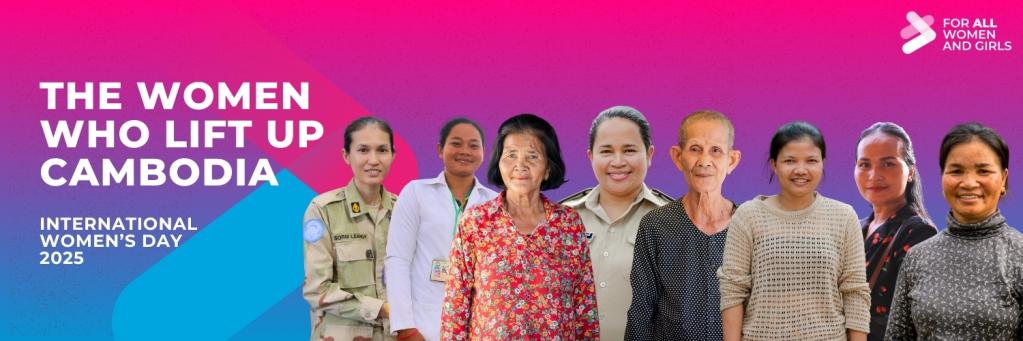
Speech
06 November 2024
2024 National Nutrition Day and the Launching of the Joint Programme SDG Seed Fund 'Transforming Cambodia’s food systems to become more sustainable, healthy, inclusive and resilient'
Excellency Ouk Rabun, Senior Minister and Chairman of CARDExcellency Chea Samnang, Vice Chairman of CARDExcellencies, Vice chairmans of CARD (tbc)Excellency Sok Silo, Secretary General of CARDMr. Jost Kadel, Deputy Chief of Mission and Head of Cooperation of the Federal republic of Germany Embassy in CambodiaRepresentatives from line ministries, development partners, and civil societyLadies, gentlemen, and youth the future leaders On behalf of the UN Resident Coordinator, it is my honor to extend warm congratulations to the Council for Agricultural and Rural Development (CARD) and the people of Cambodia on the celebration of National Nutrition Day. This occasion highlights the significant strides made in improving nutrition, thanks to the dedicated efforts of CARD, the Royal Government of Cambodia, and many committed development partners.Good nutrition is essential for health, development, and overall well-being. It supports physical growth, cognitive function, and reduces the risk of chronic diseases, leading to healthier, longer lives. Adequate nutrition also enhances maternal health, boosts economic productivity, and reduces healthcare costs by preventing disease. By promoting equity and aligning with the UN’s Sustainable Development Goals, nutrition drives sustainable development, breaking cycles of poverty and improving the quality of life for all.Over the past decades, Cambodia has made remarkable progress in improving food and nutrition security. Cambodia has launched pivotal initiatives and national strategies, such as the National Strategy for Food Security and Nutrition, aimed at tackling malnutrition and promoting healthier diets, particularly among women and children. In collaboration with multiple UN agencies and partners, public awareness campaigns have been launched to emphasize the importance of balanced diets, maternal nutrition, and effective child-feeding practices. Initiatives like school feeding programs have further enhanced nutritional intake and improved health and educational outcomes for children, while the Food Fortification Initiative has addressed micronutrient deficiencies by enriching foods with essential vitamins and minerals. These collective efforts reflect Cambodia’s commitment to addressing nutritional challenges and fostering long-term public health improvements.Today’s celebration of National Nutrition Day not only recognizes these achievements but also serves as a fitting platform to discuss the way forward how we can work together to address the ongoing challenges Cambodia is facing, such as child wasting, prevalent micronutrient deficiencies, nutritional disparities among the population groups, and overweight and obesity. I am pleased to share that three UN agencies—FAO, WFP, and UNICEF—have recently secured approval for the SDG Seed Fund Joint Programme, a transformative initiative focused on building sustainable, inclusive, and resilient food systems in Cambodia. This joint effort, guided and chaired by CARD and co-chaired by UNRC, will update Cambodia’s National Food Systems Roadmap with a focus on nutrition, climate resilience, and gender equity. This roadmap will play a critical role in reinforcing the very objectives we celebrate today—ensuring that improved nutrition outcomes remain central to sustainable development in Cambodia.This afternoon’s consultative session, dedicated to the revision of the National Food Systems Roadmap, presents a valuable opportunity to identify priority areas for action, align strategies, and establish a comprehensive investment plan. I encourage everyone to actively participate, share insights, and contribute to shaping a future where sustainable food systems drive better nutrition outcomes for all Cambodians. Before concluding, I would like to share a few messages with our youth, particularly those present here today. As future leaders, practitioners, and changemakers, you hold a unique and powerful role in shaping the future of our food systems. Today is an opportunity to make your voices heard, to share your fresh perspectives and innovative ideas that will help us set pathways toward sustainable food systems in the face of climate change.Once again, congratulations on National Nutrition Day. I wish you all a productive and insightful workshop as we work together to ensure that nutrition remains at the heart of Cambodia’s development agenda.
1 of 5
Story
30 April 2025
Cultivating Growth: Thnal Kaeng Primary School's Path to Nutritional and Academic Advancement
In the heart of Chikraeng District, Siem Reap Province, Thnal Kaeng Primary School once grappled with adversity. Housing 180 students, half of whom were girls, the school struggled with poverty, hunger among its students, frequent absences, and a distressing dropout rate. Academic performance suffered, and absenteeism cast a shadow over the institution, prompting Mrs. Yon Hea, the school principal, to take action for the holistic well-being and future prospects of her students and the school community at large. Empowering Students Through NutritionBefore the introduction of a school feeding programme, students were often too hungry to concentrate due to empty stomachs, resulting in poor academic performance and high dropout rates. Hea observed that children could barely focus on their studies, often leaving class by 09:30 am in search of food, disrupting their learning and compromising their health. Cultivating Success Through Local InitiativesOver the last two years, the school underwent a transformation with the establishment of a homegrown school feeding programme. In collaboration with the United Nation World Food Programme (WFP), the school received training in nutrition, food safety, and hygiene, empowering to the principal, cooks, and storekeeper to ensure the daily provision of nutritious meals for the students. This success was not achieved in isolation. The synergy among parents, children, and school administrators played a critical role in the programme’s triumph. Parents volunteered their time and donated essential ingredients like spices, garlic, fish paste, sugar, salt, and firewood to the school kitchen. Simultaneously, the school feeding committee engaged in fundraising activities to sustain the programme and support various school activities. A Transformed Learning Environment The impact of the school feeding programme was profound and immediate. Enhanced nutrition led to a surge in attendance rates, a decline in absenteeism, and remarkable improvements in academic performance. Students exhibited heightened alertness and concentration during lessons, resulting in significant advancements in reading proficiency and overall educational outcomes.The school feeding programme emerged as a catalyst for change and achievement for this community, showcasing the power of community engagement and the critical role of nutrition in education. The well-being, opportunities, and academic achievements of the students were markedly elevated. By addressing food insecurity, promoting health, and fostering learning capacities, the programme not only enriched the lives of the students, but also contributed to the economic vitality of the local community and rural areas, serving as a safety net for vulnerable children and nurturing their holistic development. A Lasting ImpactHea's unwavering commitment, coupled with the strong support of the community, turned a once dire situation into an inspiring narrative of success. The school feeding programme has ensured that every child at Thnal Kaeng Primary School has the chance to excel academically and enjoy good health. Beyond alleviating food insecurity and fostering well-being, the initiative has sharpened students’ learning capabilities and contributed positively to the local economy. Thanks to this programme, the children of Thnal Kaeng Primary School are now set on a path to a brighter, more promising future.
1 of 5
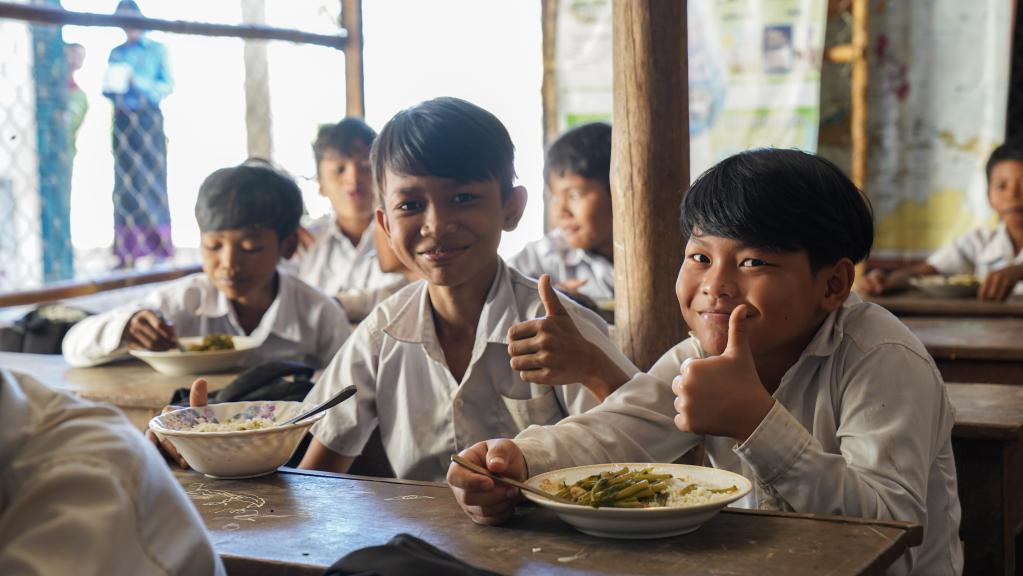
Speech
23 August 2024
National Youth Summit – Summit for the Future Cambodia
Check against delivery His Excellency. Serey Chhumneas, Secretary of State for the Ministry of Education, Youth and Sport and his teamHer Excellency. Sroy Socheat, Secretary General of the General Secretariat of the National Youth Development Council of Cambodia and Director-General of Youth, Ministry of Education Youth and Sport and her teamThe UN Resident Coordinator Mr. Jo ScheuerExcellencies and distinguished guests, development partners, UN sister agencies, civil society – and most importantly all of the young people here todayArun Suasodey Good morning! On behalf of the United Nations Country Team and as the Representative of UNFPA it is an honour and pleasure to be here today at the Summit for the Future Cambodia. We are honoured to have so many esteemed guests here today - however I am directing my remarks this morning at our youth leaders. Gathered here today are Cambodia’s leaders of both today and tomorrow - set to inherit the successes and challenges of your elders and carry them towards the future. It is an enormous privilege to meet with you and to ensure that your insights, experiences, your intellect and your passion contribute and guide the upcoming Summit of the Future scheduled to take place on September 22-23 in New York.Our Resident Coordinator and UN country team members were able to join some of you at the youth consultative workshop on the Declaration for Future Generation led by the UN Youth Advisory Panel with support from the UN Country Team in Cambodia. They were deeply inspired then, and I anticipate that we will be even more inspired today by the passion, creativity and energetic commitment to transformation and positive change by the over 250 young leaders gathered today in this hall.This national summit holds great potential, providing you a platform to address pressing issues in advance of the global Summit of the Future, and to produce an outcome statement that will effectively convey your voices and your aspirations to an international audience. As you deliberate on the critical issues facing Cambodia and the world - from climate change to social justice, from technological innovation to global governance - I urge you to dream big, to challenge the status quo, and to put forward bold, transformative solutions. Your voices, your ideas, and your actions have the power to catalyse real, lasting change.I would like to acknowledge and thank HE Dr. Hang Chuon Naron, the Deputy Prime Minister and the Minister of Education, Youth and Sports and his whole team for their leadership and the National Youth Development Council for their guidance and partnership. The commitment towards ensuring that Cambodian youth voices are heard at the global level is truly commendable. Furthermore, I would like to acknowledge the leadership and coordination of the United Nations Youth Advisory Panel Cambodia in organizing this momentous event. I also want to express appreciation to the UN Country Team, notably my own agency UNFPA and my team members who have dedicated much time, leadership and support in bringing this summit to fruition. What is really great about this event today is that it’s been truly youth led. Over the 6 past months, UNYAP alongside many youth networks have worked very hard - congratulations to UN YAP for your ability to bring together over 15 youth organisations and networks which are participating in this event today. The 12th of August marked International Youth Day and, though we may be a little late, I take this opportunity to extend my best wishes to all 250 of you in person. Happy 25th International Youth Day, everyone. There is no better way to celebrate than to be heard, and this Summit is built for exactly that purpose. Be thoughtful, be loud and be bold and brave!On behalf of the UN Country team in Cambodia, please be assured that we are resolutely committed to amplifying your calls for transformation, translating your visions and voices into tangible policies and programs, and advocating for greater youth representation in decision-making processes. We recognize that the future belongs to all of you. I eagerly anticipate the insightful discussions that lie ahead today. Thank you!
1 of 5
Story
26 March 2025
FINANCIAL INCLUSION, NOT EXPLOITATION: THE UN'S PUSH FOR ETHICAL MICROFINANCE
Recognizing the urgent need for reform, the UN Resident Coordinator, in collaboration with the National Bank of Cambodia (NBC), has convened a structured dialogue bringing together government agencies, financial institutions, investors, civil society organizations, and development partners. In November 2023, the NBC-UN Convening Multi-Stakeholder Consultation Process on Microfinance in Cambodia was launched—the first initiative of its kind. This neutral platform has engaged over 100 institutions in technical discussions, stakeholder dialogues, and high-level consultations to address the risks of unsustainable lending. The process has led to the adoption of 22 priority actions aimed at strengthening consumer protection, responsible lending, legal safeguards, and financial safety nets for rural borrowers. The UN's role in convening diverse actors has been instrumental in fostering transparency, accountability, and collaboration. UN Resident Coordinator Jo Scheuer emphasized: "The UN facilitates discussions, ensuring inclusive dialogue among stakeholders, but the progress of this initiative ultimately depends on the active participation and commitment of all involved."While encouraging steps have been taken, the path ahead remains complex. Within six months, four priority actions have been fully implemented, 15 are progressing, and three are in the early stages. Sustained coordination, follow-up, and high-quality technical advisory support will be essential to ensure that reforms lead to lasting impact. The initiative has the potential to mitigate risks of over-indebtedness and to position Cambodia's financial sector as a model for responsible microfinance governance in the region. By fostering inclusivity and collective action, the UN in Cambodia is supporting systemic change and financial services that empower individuals while safeguarding economic stability. This initiative sets a precedent for sustainable microfinance and reinforces the UN's commitment to equitable development and responsible financial inclusion.THE UN IN CAMBODIA IS DRIVING RESPONSIBLE MICROFINANCE REFORM THROUGH MULTI-STAKEHOLDER DIALOGUE, ENSURING CONSUMER PROTECTION, FINANCIAL STABILITY, AND SUSTAINABLE ECONOMIC GROWTH.
1 of 5
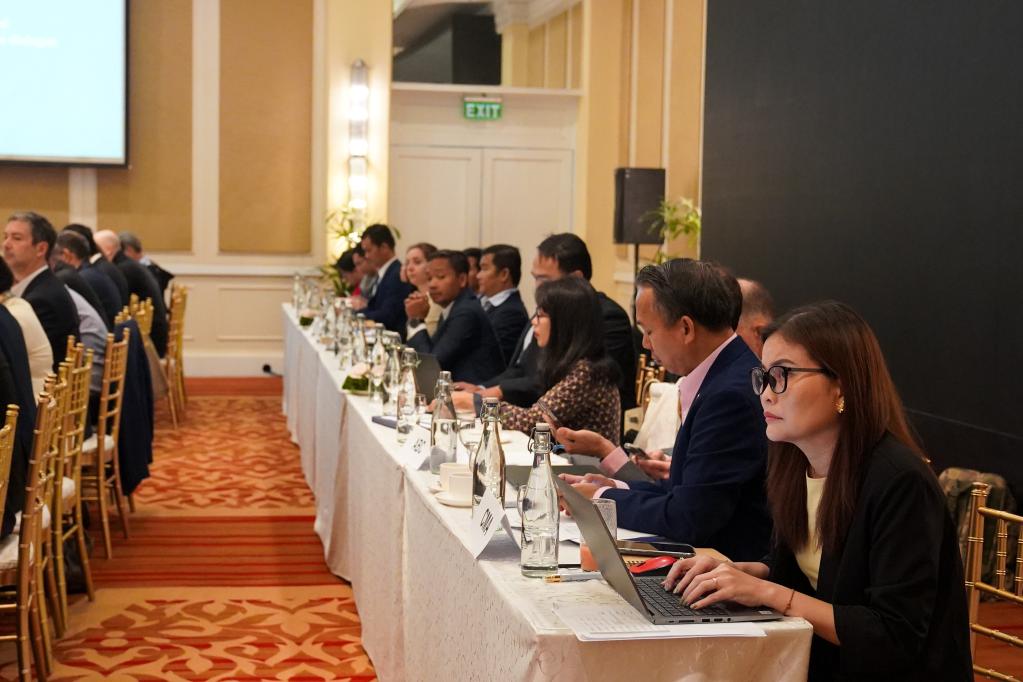
Story
20 March 2025
Sreymom: A Champion for Safe Migration and Education in Cambodia
Soun Sreymom, a former Cambodian migrant worker, now uses her experience to advocate for safe migration and workers' rights. As a leading voice in the EU-funded PROTECT project in Cambodia, she facilitates community dialogues on gender, labour rights, and violence against women, and uses her powerful photographs to spark conversation and raise awareness about safe migration.Approximately 1.3 million Cambodians work abroad, contributing significantly to Southeast Asia's economy. Women constitute nearly half of the region's 10 million migrants, forming a vital economic force through remittances that support families and communities. However, the lack of essential information and support often undermines the potential benefits of migration.Now living in a rural community in Kampong Speu Province, Sreymom’s experience highlights the issues faced by many. "I faced challenges when switching from one job to another," she reflects. "First, I believed that changing jobs would lead to safer and less demanding work environments. However, the reality was the opposite, and the difficulties got worse with each job change. We had no choice but to accept these difficult and unsafe jobs."Sreymom spent 12 years travelling between Cambodia and Thailand for work, where she encountered the stark contrast between promised opportunities and harsh realities. "When I first migrated, I didn’t know the language," she recalls. "I worked as a rubber tapper. We didn’t know when we would get paid or anything. We didn’t dare to ask because we didn’t know the language. So, for the first five months, we didn’t get any pay from the boss." Without legal documentation and facing language barriers, she endured months of unpaid labour.Khun Sophea, Country Programme Coordinator at UN Women Cambodia, highlights the isolation many women migrant workers experience: "There's a strong sense of isolation as many don't speak the language of the destination country and lack a deep understanding of its culture. Additionally, they struggle with a lack of information about essential services and don’t have any support networks, making it difficult to find help if they face abuse or discrimination.”A VOICE FOR SAFE MIGRATION After returning to Cambodia in 2018, Sreymom joined a Peer Network. Initially part of the Safe and Fair Programme, this network transitioned to the PROTECT project, a partnership between the ILO, UN Women, UNODC, and UNICEF, funded by the European Union, focused on protecting the rights of women and children migrant workers in Cambodia, Indonesia, Malaysia, and Thailand. The PROTECT project’s peer networks are vital support systems for women migrant workers across Southeast Asia, providing both online and in-person spaces in countries like Cambodia, Indonesia, Malaysia, and Thailand. These networks, operating both online and in-person in countries including Cambodia, Indonesia, Malaysia, and Thailand, provide safe spaces for women to connect, share information, share experiences, learn about risks, and access essential support services. "Mostly, as women working in other countries, we need support to talk to our families, share our problems, or find help to leave a difficult situation," Sreymom reflects. Through these networks, women gain leadership skills, better understand their rights, and reduce feelings of isolation.Through this network, Sreymom discovered the My Journey mobile app, a vital resource offering information and emergency support. "At first, as a migrant, I didn't know much. I just went. But this app guides us, no matter where we are, and provides contact numbers we can use if we are in trouble." Sreymom actively shares the app with her community, offering a lifeline of support to friends and relatives working abroad. "I share it with my relatives who are already in Thailand and lack support and information. They love the app because now they have something to rely on." As part of the same programme, Sreymom was one of 28 women selected to participate in a participatory photography project. Using mobile phones, she documented and reflected on her migration journey, capturing both the struggles and hopes within her community. The project aimed not only to gather valuable information but also to equip participants with skills in self-expression, reflection, and critical thinking. “I gained knowledge about photography and learned how to use photographs to tell stories,” says Sreymom.Currently, Sreymom is preparing to lead community dialogues on gender, migration, and violence against women. She has co-designed “Photo-language” cards to facilitate these dialogues, using the very photos taken by herself and other migrant women to share experiences and raise awareness. "I am excited to continue contributing to community dialogues, sharing my migration experience, and leading discussions using the photo-language cards," she shares. NEW ROLE IN EDUCATIONSreymom understands that education is more than just learning—it’s a lifeline. Motivated by her belief that education can prevent unsafe migration, she began teaching kindergarten in her community. "People in my village are mostly poor, and children have difficulty continuing their studies due to family conditions. Some children migrate with their parents. Without education, they will end up working in low-paid jobs or migrating without proper documentation," Sreymom explains.Her commitment has been recognised. Local authorities have informed her that she will be promoted to a formal kindergarten teacher under the Ministry of Education, Youth, and Sports. Today, Sreymom is a trusted and respected member of her community. "Some people in my village ask me if they should migrate to Thailand for work," she says. "I tell them that migration is their choice. But if they really need to go, they should go through a regular channel, with all the required documents, to be safe and avoid the hardships I faced."Her strength and community contributions exemplify what the PROTECT project aims to foster among migrant women – recognising their innate strength and capacity to transform their communities. Sophea Khun reflects, "From my experience working with women migrant workers, I find them truly amazing. They exhibit strength and courage while navigating their lives. We need to continue to find ways to raise their voices, share their experiences, and showcase their strengths."Looking back on her transformation, Sreymom says, "I've had the opportunity to become more confident and gain a clearer understanding of myself. I feel like I have been given a voice." Through her tireless work, Sreymom empowers others, ensuring that future generations of migrants are better informed, protected, and supported. -----The project "Ensuring Decent Work and Reducing Vulnerabilities for Women and Children in the Context of Labour Migration in Southeast Asia (PROTECT)", running from 2024 to 2026, is funded by the European Union and jointly implemented by the ILO, UN Women, UNICEF, and UNODC to safeguard the rights of women and children in labor migration.
1 of 5
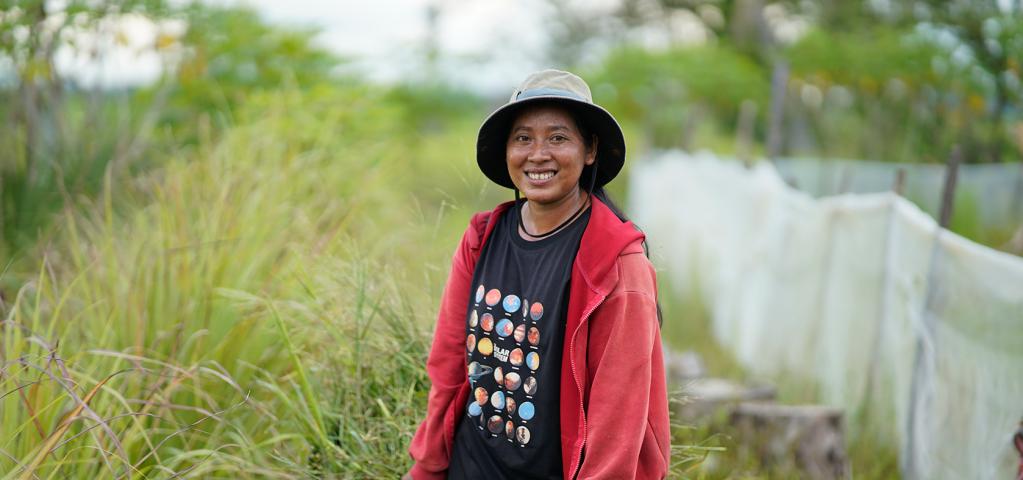
Story
18 March 2025
1st Woman-Led Fish Processing Enterprise Setting its Sights on Alibaba Empowers Next-Gen Leader
Ms. Nhem Channy, the driving force behind Battambang's Heng Channy Angkor Meas Co., Ltd., embodies the spirit of International Women's Day 2025. Her story is one of family traditions meeting modern innovation, showcasing the incredible power of women in entrepreneurship. In 2017, she founded her fish processing business, drawing on her mother's unique food preservation expertise and adding modern innovation.Heng Channy Angkor Meas boasts a diverse range of high-quality fishery and agricultural products. The company's dedication to excellence earned them the Cambodian Quality Seal (CQS), a testament to their commitment to quality and safety. This achievement was made possible through the support of the EU-funded CAPFISH-Capture: Post-harvest Fisheries Development project, implemented by the United Nations Industrial Development Organization (UNIDO) and the Fisheries Administration (FiA).Today, you can find her products in many of the major Cambodian supermarkets like Lucky, Macro, and AEON. But she also wants to sell her products beyond Cambodia. She's looking at international markets, such as working with the Thai Business Council in Cambodia to get her products into Big C and 7-Eleven stores in Thailand. She also has an export agreement with a Korean food distributor and is working on another agreement with a Korean importer, which will strengthen the presence of her products on the international stage.Looking to the future, Ms. Channy understands the importance of embracing the digital marketplace. She is exploring future market options, including the digital market platform Alibaba, which is to list her products. If she succeeds, this strategy promises to unlock new global markets and greatly expand the company's reach. Buyers were particularly impressed by the company's impact as a woman-led business: promoting local products incorporating R&D, creating jobs for locals, especially women, and providing learning opportunities for students. This highlights Ms. Channy's commitment to both business and community development.But Ms. Channy's success isn't just about business; it's also about empowering the next generation of women leaders. She has appointed her daughter as the General Manager of Heng Channy Angkor Meas, providing her with invaluable mentorship and opportunities for growth. "Leading humans requires us to be their parents, brothers and sisters, and friends," she says, emphasizing the importance of close and sincere collaboration and strategic planning.Her daughter shares her mother's forward-thinking vision, recognizing the critical role of innovation in today's rapidly evolving world. "In this contemporary world, we need more IT and innovation support to make our products more interesting and appealing," she explains. Her vision aligns perfectly with the Women's Day 2025 theme of creating a feminist future where every woman has the opportunity to thrive.Through her remarkable business sense and unwavering dedication to empowering the next generation, Ms. Channy is a true champion for women's and girls' rights, equality, and empowerment. Her commitment to showcasing the best Cambodian products on the global stage, nurtured by the support and collaboration of her daughter, serves as an inspiring example of what women can achieve when they work together to build a more equitable and prosperous future for all. Ms. Channy's story is a testament to the power of women's entrepreneurship and leadership in building a better world, perfectly embodying the spirit of International Women's Day 2025.
1 of 5

Story
24 December 2024
Making Peace Work for Everyone: Advancing Women, Peace, and Security in Cambodia
Women are indispensable to preventing conflict, building peace, and fostering recovery. Yet, their voices often remain marginalised in formal peace processes and decision-making. To address this, UN Women, in collaboration with the Ministry of Women’s Affairs Cambodia and with support from the governments of Canada, the UK, and Australia, hosted a training workshop on November 18-19, 2024. The workshop aimed to deepen the understanding of the Women, Peace, and Security (WPS) Agenda among Cambodian stakeholders. A Global Framework with Local RelevanceEven in times of peace, the WPS Agenda remains critical for fostering a fair and inclusive society. Cambodia has emerged as a regional leader in advancing the WPS framework. Local stakeholders view the Agenda as a tool for building a more equitable and secure future for all.Dr Keo Ratanak, Deputy Chief of Office, Department of Policy, Ministry of Education, Youth and Sports, emphasises, “Cambodia is a peaceful country with a strong foundation, and by addressing challenges such as gender-based violence, migration, and raising awareness about women's rights and roles, we can create an even more inclusive, equitable, and harmonious society.”Srey Sotheavy, Executive Director of the Alliance for Conflict Transformation (ACT), a prominent peacebuilding organisation, underscores the importance of systemic change, reflecting "When we talk about peace and violence, we must confront the structural issues that perpetuate harm within our society. Tackling these issues at their root is essential, and the WPS Agenda must be widely understood and put into action."Exploring New Themes in PeacebuildingThe workshop offered an in-depth exploration of global and regional WPS frameworks, addressing emerging themes like climate security and digital peacekeeping. H.E. Run Sovanntevy, Undersecretary of State, Ministry of Women’s Affairs, remarked, "The sessions on AI and disinformation were particularly enlightening. Learning from other ASEAN member states will be invaluable for developing Cambodia's National Action Plan (NAP) on WPS."Police Colonel Pech Sophealeak, Deputy Director of the Anti-Human Trafficking and Juvenile Protection Department, emphasised the importance of addressing women's cybersecurity concerns, stating, "These are not just national issues but global challenges that require collaborative solutions."
Women in Peacekeeping RolesThe WPS Agenda promotes women's meaningful participation in all aspects of peacebuilding, including peacekeeping. Women peacekeepers often have unique access to communities and serve as role models, inspiring local women to engage in peace processes. In Cambodia, this commitment is evident through its strong cohort of female peacekeepers. H.E. Koung Sorita, Secretary of State for the Ministry of Women’s Affairs, praised Cambodia’s leadership in deploying female peacekeepers, noting: "We rank highly in ASEAN but need stronger collaboration to advance this work."Domestically, women are crucial to security. Colonel Pech Sophealeak remarked: “Women in the Cambodian National Police are instrumental in ensuring safety and order for all citizens. Their active involvement is a testament to how women already contribute significantly to peace and security within the country."Towards a National Action PlanThe workshop has been a key activity in Cambodia’s progress toward developing its first National Action Plan (NAP) on Women, Peace, and Security (WPS). NAPs are vital tools for transforming global commitments into actionable national policies, ensuring governments allocate resources and create accountability frameworks to address the gendered impacts of conflict and crises.H.E. Koung Sorita, Secretary of State for the Ministry of Women’s Affairs, and the chair of ASEAN Advisory Group on Women, Peace, and Security, outlined Cambodia’s approach to developing its NAP, stating, "We have prioritised the WPS agenda within the policy of Neary Ratanak VI in the new mandate of ministry, focusing on strengthening the empowerment of women and girls into governmental policies and programs in all sectors and all levels. However, this is not a task we can achieve alone, it requires collaboration with other stakeholders, especially inter-ministerial institutions, Civil Society Organizations and Development Partners." A Collaborative Path ForwardCivil society organisations (CSOs) play a pivotal role in advancing the WPS Agenda, given their deep connections with local communities and their understanding of on-the-ground challenges. As Norul Mohamed Rashid noted, "CSOs are crucial in advancing the WPS Agenda, addressing issues that matter most to women and girls through grassroots engagement."Srey Sotheavy further emphasised the importance of collaboration, saying, "No single entity can achieve the WPS Agenda's goals alone. Sustained cooperation between governments, CSOs, and international partners is essential."Cambodia’s commitment to the WPS Agenda reflects its vision for an inclusive, sustainable peace. By prioritising women’s participation and addressing systemic barriers, the country is laying the groundwork for a more secure and equitable future.As Dr Keo Ratanak reflected, "Peace is a big concept, but when we respect and apply these principles, we can achieve a more peaceful and equitable society."
Women in Peacekeeping RolesThe WPS Agenda promotes women's meaningful participation in all aspects of peacebuilding, including peacekeeping. Women peacekeepers often have unique access to communities and serve as role models, inspiring local women to engage in peace processes. In Cambodia, this commitment is evident through its strong cohort of female peacekeepers. H.E. Koung Sorita, Secretary of State for the Ministry of Women’s Affairs, praised Cambodia’s leadership in deploying female peacekeepers, noting: "We rank highly in ASEAN but need stronger collaboration to advance this work."Domestically, women are crucial to security. Colonel Pech Sophealeak remarked: “Women in the Cambodian National Police are instrumental in ensuring safety and order for all citizens. Their active involvement is a testament to how women already contribute significantly to peace and security within the country."Towards a National Action PlanThe workshop has been a key activity in Cambodia’s progress toward developing its first National Action Plan (NAP) on Women, Peace, and Security (WPS). NAPs are vital tools for transforming global commitments into actionable national policies, ensuring governments allocate resources and create accountability frameworks to address the gendered impacts of conflict and crises.H.E. Koung Sorita, Secretary of State for the Ministry of Women’s Affairs, and the chair of ASEAN Advisory Group on Women, Peace, and Security, outlined Cambodia’s approach to developing its NAP, stating, "We have prioritised the WPS agenda within the policy of Neary Ratanak VI in the new mandate of ministry, focusing on strengthening the empowerment of women and girls into governmental policies and programs in all sectors and all levels. However, this is not a task we can achieve alone, it requires collaboration with other stakeholders, especially inter-ministerial institutions, Civil Society Organizations and Development Partners." A Collaborative Path ForwardCivil society organisations (CSOs) play a pivotal role in advancing the WPS Agenda, given their deep connections with local communities and their understanding of on-the-ground challenges. As Norul Mohamed Rashid noted, "CSOs are crucial in advancing the WPS Agenda, addressing issues that matter most to women and girls through grassroots engagement."Srey Sotheavy further emphasised the importance of collaboration, saying, "No single entity can achieve the WPS Agenda's goals alone. Sustained cooperation between governments, CSOs, and international partners is essential."Cambodia’s commitment to the WPS Agenda reflects its vision for an inclusive, sustainable peace. By prioritising women’s participation and addressing systemic barriers, the country is laying the groundwork for a more secure and equitable future.As Dr Keo Ratanak reflected, "Peace is a big concept, but when we respect and apply these principles, we can achieve a more peaceful and equitable society."
1 of 5
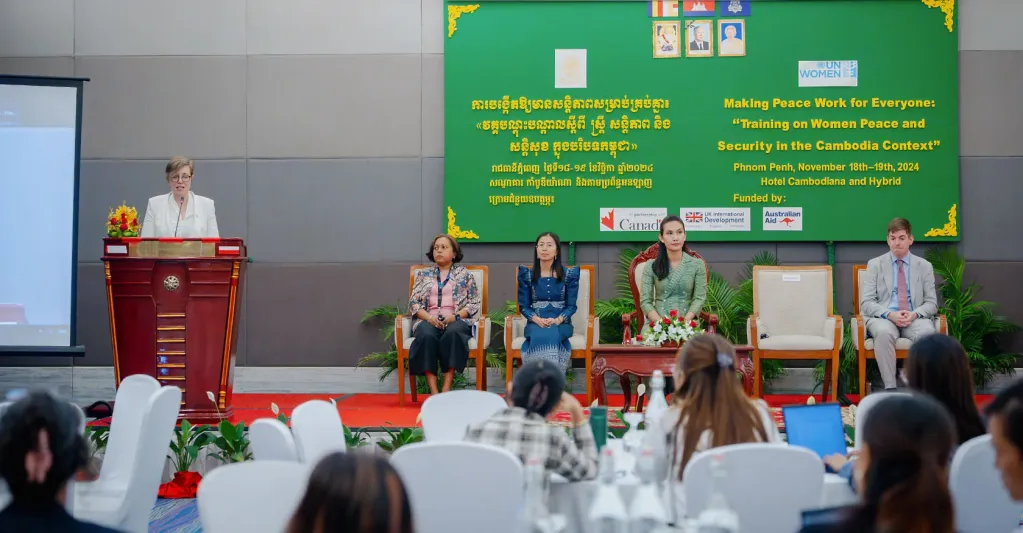
Story
16 December 2024
The Inspiring Journey of Dara: From Migrant Worker to Skilled Engineer
Only in the 11th grade, Dara had already worked as a construction worker and a security guard. Not long after, he applied for a job in Thailand where he worked in a chicken and seafood factory. Here, he experienced challenges such as language barriers, age and racial discrimination, and inferiority. Despite this, Dara was determined to perform his tasks well. He worked tirelessly, studied Thai on his own, and braved the criticism daily. After five years, Dara returned to Cambodia with the intention of renewing his passport until a new employment opportunity came that paid better than his job in Thailand. With the support of the International Organization for Migration (IOM), Dara was able to complete a 4-month technical and vocational training in air conditioner servicing at the National Polytechnic Institute of Angkor (NPIA). After this accreditation, Dara has found stable employment at the Temple Group as an engineer. Alongside this, Dara is pursuing his technical and vocational training levels 2 and 3 at NPIA. Dara says, “I recommend for other [returning migrants] to go back to school and learn technical skills that can be used to earn a living. Like the Khmer proverb goes, “If you are not intelligent, you should acquire skills.” Being an expert in something enables you to earn a living and have a stable income. Nowadays, companies prioritize people with certificates over those who only have experience. If you only have experiences and no certificate, you might get paid less.” In the future, Dara wants to open his own mechanical shop that provides maintenance services and sells spare parts. According to Dara, he contributed to the Thai economy when he was in Thailand. Upon return to Cambodia, he can already contribute to his own country using his acquired expertise. Dara recognizes that everyone’s contribution both big and small can significantly contribute to Cambodian economy. With skills development and recognition, migrant workers like Dara can harness the potential of migration to drive sustainable development and improve the lives of many.
1 of 5
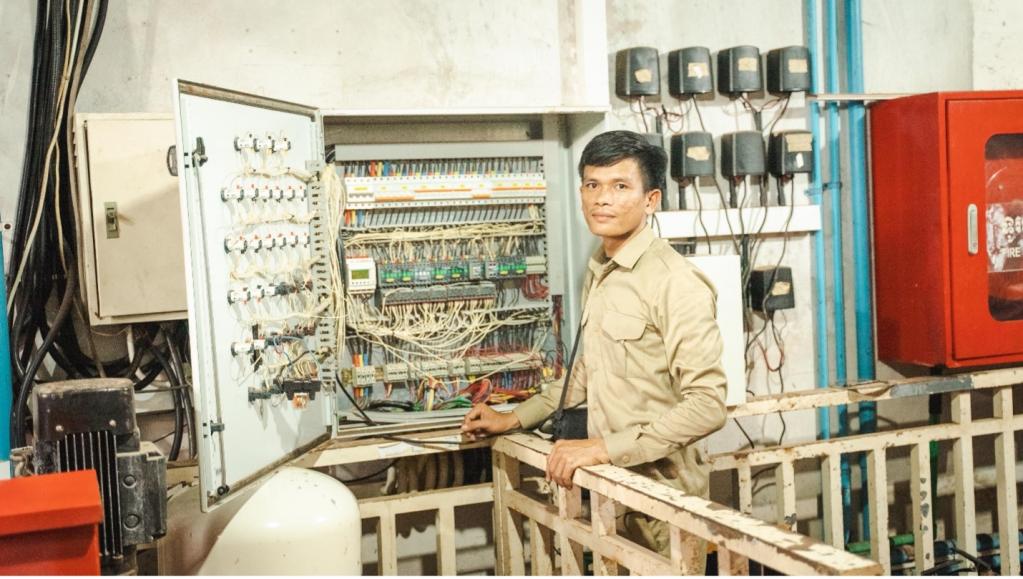
Press Release
05 June 2025
CPC Takes a Step Forward in Packaging Excellence with WPO's Membership
Launched in 2024 as part of an initiative by the Food Technology, Research, and Innovation Platform (FTRIP), established under the EU-funded CAPFISH-Capture: Post-harvest Fisheries Development project, CPC aims to contribute to advances in packaging research and development. Its focus is on delivering tailored solutions for local needs and providing training to equip food professionals with the skills necessary for effective, sustainable packaging practicesIn a marketplace that is increasingly connected globally, innovative packaging can play an essential role in ensuring food safety, preventing contamination, and extending shelf life, particularly for export products. Meeting international standards through improved packaging can help Cambodian products access new markets and enhance their competitiveness. Moreover, better packaging solutions can also help reduce food loss and waste along the supply chain, supporting efforts toward food security and sustainability.Membership in the WPO provides CPC with access to technical expertise, new packaging technologies, and good practices from around the world. These resources can support Cambodia's ongoing efforts to meet global food safety requirements, strengthen the capacity of local SMEs, and encourage the adoption of more sustainable, eco-friendly packaging practices that align with broader development objectives.“This milestone marks an important step for Cambodia's packaging sector,” said Dr. Buntong Borarin, CPC Senior Coordinator. "It offers opportunities for collaboration, knowledge sharing, and technological growth, which can help improve our local industry's standards and export potential, while benefiting consumers and producers alike."Cambodia's role in promoting sustainable food systems and packaging innovations is gaining recognition internationally. This development can help build confidence in Cambodian products and expand their export potential, contributing to job creation and economic resilience across the country.Through CPC's WPO membership, we aim to share expertise, adopt best practices, and contribute to regional and global development. This effort can help build long-term resilience and promote sustainability within Cambodia's food and packaging sectors,” said Dr. Shetty Seetharama Thombathu, UNIDO Chief Technical Advisor for the CAPFISH-Capture project, which is implemented by UNIDO in collaboration with the Fisheries Administration (FiA).This progress reflects CPC's ongoing commitment to supporting safe, innovative, and sustainable packaging solutions that can benefit Cambodia's economy, protect consumer health, and support continued development in the sector.
1 of 5
Press Release
05 May 2025
SIEM REAP PRAHOK EARNS GEOGRAPHICAL INDICATION STATUS: A TRADITION-DRIVEN ECONOMIC EMPOWERMENT
The event was presided over by H.E. Cham Nimul, Minister of Commerce and Chairperson of the National Committee for Intellectual Property (NCIP), alongside H.E. Hem Vanndy, Minister of Industry, Science, Technology and Innovation; H.E. Dith Tina, Minister of Agriculture, Forestry and Fisheries; and H.E. Igor Driesmans, the EU Ambassador to Cambodia. Distinguished representatives from international development partners, the private sector, academia, civil society, and university students also joined the event. A special highlight was the message from Samdech Moha Borvor Thipadei Hun Manet, Prime Minister of Cambodia, celebrating this significant occasion. H.E. Cham Nimul underscored the Ministry’s pivotal role in advancing Cambodia’s Geographical Indication (GI) system as a tool for sustainable trade and rural development. She remarked, "The official recognition of Siem Reap Prahok as a GI product reflects our continued efforts to protect and promote Cambodia’s unique cultural assets through a strong intellectual property framework. This milestone not only safeguards traditional knowledge but also enhances the marketability and competitiveness of local products at both national and international levels. The Ministry of Commerce remains committed to strengthening the GI system as a strategic instrument for inclusive economic growth and value-added trade."The EU emphasizes the importance of GIs for rural development and economic empowerment. H.E. Igor Driesmans stated, "GIs are powerful tools for empowering smallholder producers, preserving traditions, and promoting responsible resource management, thus contributing to sustainable development." He added, "GIs play a vital role in Europe, with over 3,500 registered, and the EU has supported the development of Cambodia's GI system for over a decade by providing capacity building and technical assistance. The EU's efforts focus on sustainable fisheries value chains and quality standards, fostering innovation to enhance the economic and cultural value of local products."Siem Reap Prahok joins other iconic Cambodian products like Kampot pepper, Kampong Speu palm sugar, and Mondulkiri wild honey, underscoring the country's commitment to enhancing product identity and supporting rural livelihoods. H.E. Dith Tina noted that "Siem Reap Prahok symbolizes the linkage between our traditions and sustainable development, ensuring quality for consumers and bolstering the competitiveness of Cambodia's agricultural sector."As a newly recognized GI product, Siem Reap Prahok not only fosters economic growth but also protects traditional practices and the environment. H.E. Dith Tina emphasized the agricultural sector is crucial to Cambodia, stating, "The Ministry is committed to strengthening this sector by improving value chains, promoting sustainable practices and resilience, in alignment with the Royal Government's Pentagon Strategy Phase1 and the National Agricultural Development Policy 2022-2030." This commitment enhances market opportunities for producers while ensuring consumers receive quality and authentic products.Siem Reap Prahok is a vibrant celebration of Cambodia's culinary traditions, deeply rooted in the history of the Angkor Empire, where local ingredients and flavors were cherished. With its GI status, Siem Reap Prahok will strengthen the livelihoods of local producers while enhancing Cambodia's visibility in the global market, allowing the world to appreciate its rich culinary heritage.
1 of 5
Press Release
29 April 2025
Cambodia, KOICA and WFP Launch US$ 10 Million Initiative to Advance the National Homegrown School Feeding Programme
The national programme currently reaches 190,000 children across 686 schools. The renewed support from South Korea builds on the achievements of Phase I (2020—2024) and will enable MoEYS and WFP to provide hot, nutritious meals to 133,300 pre-primary and primary schoolchildren across 428 schools. These schools will be progressively integrated into the national programme through a phased handover process, based on their readiness, with full government ownership and management expected by 2028.
“The Ministry is deeply grateful for the continued support from the Government of Republic Korea, KOICA, and WFP,” said H.E. Hang Chuon Naron, Deputy Prime Minister and Minister of Education, Youth and Sport. “Through this programme, we are not only improving access to nutritious food but also investing in Cambodia’s future by building a stronger, more resilient education system that supports our national development goals.” The Royal Government of Cambodia has shown strong leadership and commitment to school feeding. In August 2024, it approved the School Feeding Policy, a landmark step that formalized the programme’s role in contributing to education, nutrition, agriculture, and social protection. This approach aligns closely with Cambodia’s broader human capital development agenda and the priorities of the Pentagonal Strategy—building a healthier, more educated, and resilient generation.“We are honoured to continue this important collaboration with the Royal Government of Cambodia and WFP,” said Ms. Moon Jung Choi, Country Director of KOICA Cambodia Office. “This second phase of support reaffirms the Government of Republic Korea’s commitment to inclusive and sustainable development for the Cambodian people by supporting national systems that deliver lasting improvements in education, nutrition and rural livelihoods.”The programme adopts a home-grown approach, linking education and nutrition with local agriculture by sourcing food from smallholder farmers. In a country where 57 percent of households rely on agriculture, this approach stimulates local economies, strengthens food systems, and serves as a safety net for vulnerable families affected by recurrent shocks.In addition to meal provision, the programme focuses on capacity strengthening, infrastructure upgrades, and institutional development at national, sub-national, and school levels. These efforts are designed to enable MoEYS to gradually take full ownership, while ensuring the quality, efficiency, and sustainability of the programme. “WFP is proud to continue supporting Cambodia’s journey towards a nationally owned, sustainable school feeding programme,” said Claire Conan, WFP Representative in Cambodia. “The renewed partnership with KOICA and MoEYS is a powerful example of how collaboration can improve children's well-being, enhance learning, and build more resilient communities.”The launch of this new phase marks a deepening partnership between MoEYS, KOICA, and WFP to invest in Cambodia’s future—one school meal at a time. # # # For more information, please contact (email address: info@moeys.gov.kh or chou.chea@wfp.org):The Ministry of Education, Youth, and Sports, MoEYS/Cambodia, Mob. +855 12625538Chou Chea, WFP/ Cambodia, Mob. +855 78565283
“The Ministry is deeply grateful for the continued support from the Government of Republic Korea, KOICA, and WFP,” said H.E. Hang Chuon Naron, Deputy Prime Minister and Minister of Education, Youth and Sport. “Through this programme, we are not only improving access to nutritious food but also investing in Cambodia’s future by building a stronger, more resilient education system that supports our national development goals.” The Royal Government of Cambodia has shown strong leadership and commitment to school feeding. In August 2024, it approved the School Feeding Policy, a landmark step that formalized the programme’s role in contributing to education, nutrition, agriculture, and social protection. This approach aligns closely with Cambodia’s broader human capital development agenda and the priorities of the Pentagonal Strategy—building a healthier, more educated, and resilient generation.“We are honoured to continue this important collaboration with the Royal Government of Cambodia and WFP,” said Ms. Moon Jung Choi, Country Director of KOICA Cambodia Office. “This second phase of support reaffirms the Government of Republic Korea’s commitment to inclusive and sustainable development for the Cambodian people by supporting national systems that deliver lasting improvements in education, nutrition and rural livelihoods.”The programme adopts a home-grown approach, linking education and nutrition with local agriculture by sourcing food from smallholder farmers. In a country where 57 percent of households rely on agriculture, this approach stimulates local economies, strengthens food systems, and serves as a safety net for vulnerable families affected by recurrent shocks.In addition to meal provision, the programme focuses on capacity strengthening, infrastructure upgrades, and institutional development at national, sub-national, and school levels. These efforts are designed to enable MoEYS to gradually take full ownership, while ensuring the quality, efficiency, and sustainability of the programme. “WFP is proud to continue supporting Cambodia’s journey towards a nationally owned, sustainable school feeding programme,” said Claire Conan, WFP Representative in Cambodia. “The renewed partnership with KOICA and MoEYS is a powerful example of how collaboration can improve children's well-being, enhance learning, and build more resilient communities.”The launch of this new phase marks a deepening partnership between MoEYS, KOICA, and WFP to invest in Cambodia’s future—one school meal at a time. # # # For more information, please contact (email address: info@moeys.gov.kh or chou.chea@wfp.org):The Ministry of Education, Youth, and Sports, MoEYS/Cambodia, Mob. +855 12625538Chou Chea, WFP/ Cambodia, Mob. +855 78565283
1 of 5
Press Release
08 April 2025
Asia-Pacific Global Accelerator Policy Forum calls for major scale-up of strategies and financing to deliver skills, decent jobs and universal social protection
PHNOM PENH (ILO News) – A significant scale-up of national strategies and financing is essential to deliver skills, decent jobs and universal social protection across the Asia-Pacific region, participants emphasized at the opening of a major regional forum in Phnom Penh today.The Asia Pacific Global Accelerator Policy Forum - Meeting the Commitments for Productive Employment and Universal Social Protection co-hosted by the International Labour Organization (ILO) and the Government of Cambodia in collaboration, represented by the Ministry of Labour and Vocational Training, with United Nations partners, explores innovative solutions that support more and better jobs, stronger social protection systems and resilient economies across Asia and the Pacific.Over the course of two days, the event brings together governments, UN partners, employers and trade union representatives to develop practical strategies to align social protection with green and digital transitions, develop sustainable financing models, and implement skills and employment policies that drive economic growth and equity. Delegates from Cambodia, Indonesia, Nepal, Pakistan, the Philippines and Viet Nam will share experiences as ‘Pathfinder’ countries piloting innovative approaches. The forum will also feature the voices of workers and businesses, highlighting real stories to inspire stronger commitments from policymakers, partners and funders.Following the forum an outcome report will be developed, detailing the key findings and helping map out steps and recommendations for further action. In his keynote address, His Excellency, Deputy Prime Minister and Minister for Economy and Finance, Cambodia, said: “In a global context of high uncertainties that could derail global socio-economic growth... the organization of this forum is truly important and on the right direction, as well as a testament to the continued commitment and value placed on cooperation and mutual exchange and sharing of experiences to achieve common goals, namely the Sustainable Development Goals (SDGs) for Pathfinder countries and the whole world.”Mia Seppo, Assistant Director-General, Jobs and Social Protection, ILO, noted: “The ambitions of the Global Accelerator cannot be fulfilled through business as usual. We need bold, integrated policies backed by investment and sustained through genuine dialogue. This Forum is not just timely—it is vital.”Addressing the opening session, His Excellency Minister Heng Sour, Minister of Labour and Vocational Training, Cambodia, said: “This two-day forum comes at a pivotal moment—amid growing global geopolitical and geo-economic competition and increasing uncertainties, which pose significant challenges to sustainable development and resilience across the Asia-Pacific region.” He added that “As the government institution leading the implementation of the Roadmap, the Ministry of Labour and Vocational Training will intensify efforts to enhance skills development and social protection for workers and employees—especially youth, migrant workers, women, persons with disabilities, and those in the informal economy—so they can access opportunities for advancement during this transition.” David McLachlan-Karr, Regional Director, UN Development Coordination Office for Asia-Pacific, said: “This is precisely where the Global Accelerator can play a transformative role: not by tackling issues in isolation, but by fostering collaboration and partnerships through integrated strategies that bring together stakeholders, align policies, and coordinate financing around a common vision.” Representing workers, Elly Rosita Silaban, President of the Confederation of All Indonesian Trade Unions (KSBSI), stressed the importance of social dialogue and policies that address job security, fair wages, and social protection: “For the Global Accelerator to deliver real impact, trade unions must be effectively engaged in its implementation. We bring workers' voices to the table, ensuring that just transitions create decent jobs and social protection for all. Strong union participation means stronger policies that truly work for workers, and collective bargaining is the foundation of sustainable progress.” Meanwhile, Tahir Javaid Malik, representative of Employers Federation of Pakistan, underscored the need for a skilled and protected workforce: “Investing in skills and social protection isn’t just corporate responsibility—it’s a strategic advantage that fuels innovation, stability, and long-term success in Asia’s private sector.” The Global Accelerator on Jobs and Social Protection for Just Transitions is a UN initiative that helps countries align employment policies, social protection systems, and financing strategies to drive inclusive growth. It brings together governments, international organizations, businesses, and workers to mobilize investment and deliver tangible results for people and communities. – END – For more informationPichit PhromkadeCommunications OfficerILO Regional Office for Asia and the PacificEmail: phromkade@ilo.org
1 of 5
Press Release
03 April 2025
Media Advisory: Asia-Pacific Global Accelerator Policy Forum
Leaders across Asia-Pacific to gather in Phnom Penh to drive investments in jobs and social protection.
High-level government officials, UN leaders, employers and workers’ representatives will gather at the Asia-Pacific Global Accelerator Policy Forum to accelerate progress towards productive employment and universal social protection across the region.Global Accelerator is an initiative of the UN Secretary General to accelerate progress to the Sustainable Development Goals. Co-hosted by the International Labour Organization and Government of Cambodia, represented by the Ministry of Labour and Vocational Training (MLVT), with the strong collaboration of UN partner agencies, the Asia-Pacific Global Accelerator Policy Forum will focus on innovative solutions that strengthen employment policies, expand social protection, and drive sustainable economic growth.WHATA high-level forum bringing together policymakers, social partners, and development agencies to advance commitments on:Skills development supporting decent work and just transitionsSocial protection for allSustainable financing for jobs and skills developmentGreen, digital, economic and demographic transitions in the labour marketWHOKey speakers and participants include:H.E. Dr Aun Pornmoniroth, Deputy Prime Minister and Minister for Economy and Finance, CambodiaH.E. Heng Sour, Minister of Labour and Vocational Training, CambodiaMia Seppo, Assistant Director General, Jobs and Social Protection, ILODavid McLachlan-Karr, Regional Director, UN Development Coordination Office for Asia-PacificSenior representatives from governments, employers' organizations, trade unions, and international development agenciesWHEN & WHERE: 8 and 9 April 2025, Hyatt Regency Phnom PenhMEDIA OPPORTUNITIESMedia are invited to attend the opening session of the event from 09.00-10.10hrs on 8 April 2025. Interview opportunities will be considered on request. Media registration is required. Please confirm attendance by 7 April 2025 via email at phromkade@ilo.org. For more information, please contact Mr Pichit Phromkade, Communications Officer, ILO Regional Office for Asia and the Pacific at phromkade@ilo.org.
High-level government officials, UN leaders, employers and workers’ representatives will gather at the Asia-Pacific Global Accelerator Policy Forum to accelerate progress towards productive employment and universal social protection across the region.Global Accelerator is an initiative of the UN Secretary General to accelerate progress to the Sustainable Development Goals. Co-hosted by the International Labour Organization and Government of Cambodia, represented by the Ministry of Labour and Vocational Training (MLVT), with the strong collaboration of UN partner agencies, the Asia-Pacific Global Accelerator Policy Forum will focus on innovative solutions that strengthen employment policies, expand social protection, and drive sustainable economic growth.WHATA high-level forum bringing together policymakers, social partners, and development agencies to advance commitments on:Skills development supporting decent work and just transitionsSocial protection for allSustainable financing for jobs and skills developmentGreen, digital, economic and demographic transitions in the labour marketWHOKey speakers and participants include:H.E. Dr Aun Pornmoniroth, Deputy Prime Minister and Minister for Economy and Finance, CambodiaH.E. Heng Sour, Minister of Labour and Vocational Training, CambodiaMia Seppo, Assistant Director General, Jobs and Social Protection, ILODavid McLachlan-Karr, Regional Director, UN Development Coordination Office for Asia-PacificSenior representatives from governments, employers' organizations, trade unions, and international development agenciesWHEN & WHERE: 8 and 9 April 2025, Hyatt Regency Phnom PenhMEDIA OPPORTUNITIESMedia are invited to attend the opening session of the event from 09.00-10.10hrs on 8 April 2025. Interview opportunities will be considered on request. Media registration is required. Please confirm attendance by 7 April 2025 via email at phromkade@ilo.org. For more information, please contact Mr Pichit Phromkade, Communications Officer, ILO Regional Office for Asia and the Pacific at phromkade@ilo.org.
1 of 5
Latest Resources
1 / 11
Resources
12 June 2024
Resources
09 January 2024
1 / 11

